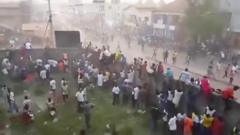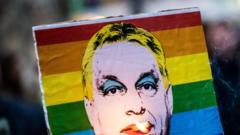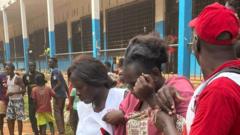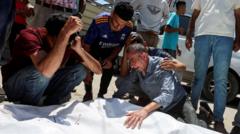At least 56 people died and many others were injured during a stampede after a football match in Guinea's Nzérékoré, as officials report a chaotic scene fueled by crowd unrest.
Tragedy Strikes: 56 Dead in Football Match Crush in Guinea

Tragedy Strikes: 56 Dead in Football Match Crush in Guinea
A violent crowd surge at a football match in Nzérékoré has led to a significant loss of life, raising urgent questions about safety measures in public events.
At least 56 people have died in a tragic crowd crush that occurred during a football match in Nzérékoré, Guinea's second-largest city, according to government officials. The unrest began after supporters of the visiting team, Labé, reacted violently to a controversial decision made by the referee. This led to clashes, with local police using tear gas to control the situation, sparking a dangerous stampede among the thousands of spectators present at the match.
Despite efforts by local authorities to manage the crisis, a doctor reported seeing "bodies lined up as far as the eye can see" in hospitals overwhelmed with casualties. Eyewitnesses described harrowing scenes outside the stadium, with large crowds trying to breach barriers amid growing panic. The situation was reportedly so dire that law enforcement has restricted internet access to the region, with police guarding hospital entrances to maintain order.
Guinean Prime Minister Mamadou Oury Bah characterized the event as "tragic," vowing to conduct an inquiry to hold those responsible accountable. He offered condolences to the victims' families and pledged support for the injured, which includes both medical and psychological assistance. This incident has unfolded as part of a series of tensions within Guinean football, highlighted by ongoing investigations into corruption and violence involving prominent football figures, including Aboubacar Sampil, the head of the country's football federation.
As the nation mourns, questions about crowd control measures at public events continue to mount. Amid a backdrop of political unrest following a coup in September 2021, the government faces heightened scrutiny over its ability to ensure safety for its citizens during large gatherings. As investigations proceed, this incident may lead to broader discussions on governance in sports and the protection of public safety in Guinea.





















